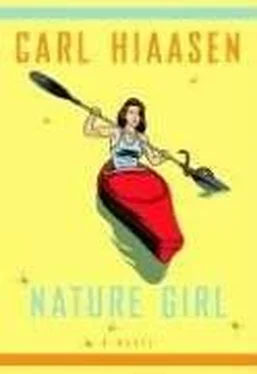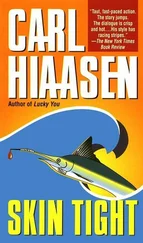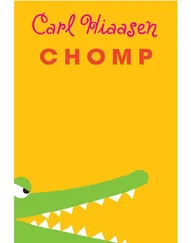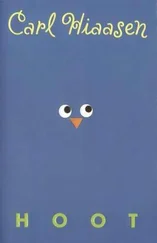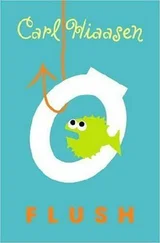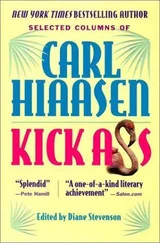Slumped against the wooden cross, Shreave stared out across the Gulf of Mexico and assayed his prospects, which were not as gloomy as he’d initially believed. The running lights of several large vessels were visible offshore, so he knew it was only a matter of time before somebody spotted him. At that point a major life decision would be required. Shreave ruled out a return to Texas, having no desire to face Lily’s wrath and his mother’s scalding denigrations. It never occurred to him that neither woman was interested in his whereabouts or his intentions.
Florida might be worth a shot, Shreave mused. Boca Raton supposedly had more telephone boiler rooms than Calcutta.
He gnawed on a hunk of sourdough but nearly gagged on the lukewarm Tang. The waves whispered him to sleep, and he awoke at daybreak sucking on his NASCAR toothbrush. Glancing up, he was alarmed to see-preening on the crossbeam of the bogus cross-a large white-capped bird that he recognized from countless documentaries on the Discovery Channel as an American bald eagle.
“Boo!” Shreave yelled hoarsely. “Beat it!”
The eagle was old and hunched, yet its amber gaze was penetrating. The flexed talons were larger than Shreave’s hands, and he didn’t doubt for a second that the predator was capable of removing his face with one swipe.
“Go away!” he brayed twice, whereupon the great bird hitched its chalky tail feathers, uncorked a prodigious bowel movement and flew away.
With a woeful moan, Shreave rolled himself down the dune, over the cold fire pit and into the water. There he threshed in hysterics, trying to slosh off the pungent stickum of feathers, bones, fur, mullet scales, cartilage and less identifiable ingredients of the jumbo eagle dropping.
It was in this frothing state of aggrievement that he was found by a passing park ranger, drawn to the scene by Shreave’s howls. After being hauled aboard the patrol boat, he was transported in his befouled Speedos to the public landing at Everglades City. There he was hosed off vigorously and examined by a paramedic wearing full biohazard gear.
Later, sporting ghastly tartan shorts and a double-knit golf shirt donated by the local Red Cross, Boyd Shreave wandered alone to the Rod and Gun Club, where he slapped his wife’s MasterCard on the old mahogany bar. The bartender was the same one who’d provided directions on the night that he and Genie had arrived, but the man didn’t recognize him. Shreave’s bearing had been considerably diminished on Dismal Key by a deleterious combination of sun poisoning, wind chafing and general character abasement.
After five Coronas, Shreave felt not nearly so adrift and out of sorts. A couple in their sixties, plainly from the Midwest, settled a few bar stools away and began rhapsodizing about their vacation to southwest Florida.
“It was twelve degrees at O’Hare this morning!” the wife chortled.
“Three below with the windchill,” said her husband.
“I don’t want to go home, Ben. It’s so incredible here.”
“McMullan called from the club-the lake on the seventeenth hole is froze solid. The kids are out there playing ice hockey with dog turds.”
“Ben, did you hear what I said? I really do not wish to go back.”
“You mean it?”
Boyd Shreave picked up his beer bottle and moved closer.
“We could get a place in Naples,” the wife was suggesting.
“Or right here on the river,” said the husband. “Buy a boat and dock it behind the house.”
The bartender had heard the same conversation maybe a thousand times, but to a defrocked telemarketer from Texas it was revelatory; a thunderbolt of inspiration.
“It’s paradise here,” Shreave heard himself say. “Heaven on earth.”
The husband turned on his bar stool. “Today I caught eight ladyfish, and a flounder as big as a hubcap. That’s no lie!”
His wife said, “But what about the mosquitoes? I hear it’s torture in the summer.”
Shreave smiled. “That’s what the locals tell all the Yankees. You folks seriously in the market?”
“Aw, we’re just dreamin’ out loud,” the husband said.
“No, we’re serious,” the woman spoke up. “I’m serious. Do you live here?”
Shreave didn’t hesitate. “Just up the road,” he said.
It had of course dawned on him that, being immune to the wonders of the place, he was ideally equipped to exploit it. Erik fucking Estrada, eat your heart out.
The husband introduced himself. Shreave shook his hand and said, “I’m Boyd Eisenhower.”
“Like the president?”
“No relation, I’m afraid.”
The wife asked, “Are you a broker?”
“I handle a few select waterfront properties, yes.”
Shreave was experimenting with a new, low-key style. The beers definitely helped. So far, the couple had not recoiled or grown even slightly leery in his presence; just the opposite. They were so eager to escape Chicago that they hadn’t noticed he was half-trashed.
“And what would it cost,” the husband was saying, “for, oh, a three-two on the river? Hypothetically, I mean.”
“Or a town house on Marco,” the woman added eagerly. “Do you have a card, Mr. Eisenhower?”
“Not with me.” Boyd Shreave experienced a rush like no other. It was, he believed, his deliverance.
“Let me take your number,” he said, reaching for a cocktail napkin.
First thing in the morning, he would inquire about a real-estate license.
I am home, he thought. At last.
The eagle flew south and spent the night in the top of a dead black mangrove along the Lostmans River. Even from a distance Sammy Tigertail could see that the bird was ancient, and he wondered if it was the ghost spirit of Wiley, the demented white writer about whom his Uncle Tommy sometimes told stories.
At dawn Sammy Tigertail motored the johnboat to the base of the mangrove tree and called up at the eagle, which responded by yakking up a fish head. The Indian waved respectfully and headed upriver to check the spot where he’d submerged the corpse of Louis Piejack. It was the same deep hole in which eleven days earlier he had anchored Jeter Wilson, the luckless dead tourist. Recently, Wilson’s rented car had been recovered from the murky Tamiami Trail canal, which was now being searched by snake-wary police divers. Sammy Tigertail wasn’t in any hurry to come out of hiding.
No evidence of Wilson or Piejack had surfaced in Lostmans, so the Indian returned to his campsite near Toms Bight and carefully hid the johnboat. The day before, a chopper had passed overhead half a dozen times-it wasn’t the Coast Guard or the Park Service, but nonetheless Sammy Tigertail was on edge. He knew somebody was looking for something, although he wouldn’t have guessed that it was Gillian St. Croix looking for him, and that she was paying for the helicopter charters with a tuition refund from Florida State University. No longer was she a fighting Seminole.
Concealed by a clumsily woven canopy of palm fronds, Sammy Tigertail spent the daylight hours re-reading Rev. MacCauley’s journal and constructing a new guitar. From the shattered Gibson he had salvaged the neck, the tuning pegs and five strings; the body he was laboriously shaping with his Buck knife from a thick plank of teak that he’d gotten from a derelict sailboat. Sammy Tigertail was by no means an artisan yet it was satisfying work, and a task of which the inventive Calusas would have approved.
A month’s worth of gasoline and provisions had been delivered by Sammy Tigertail’s half brother, Lee, whom Sammy had contacted with a cellular phone that he’d found in Piejack’s johnboat. It was Lee who had delivered the news about Wilson’s car, and he’d agreed it would be premature for Sammy to return to the reservation. During Lee’s visit they had selected future drop sites and a timetable. Aware that his half brother’s wilderness skills were not as advanced as those of a full-blooded Seminole, Lee had also provided a compass, a dive watch, a NOAA marine chart and a bag of flares.
Читать дальше
